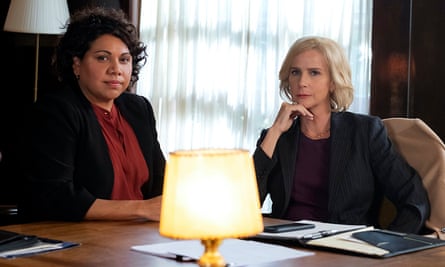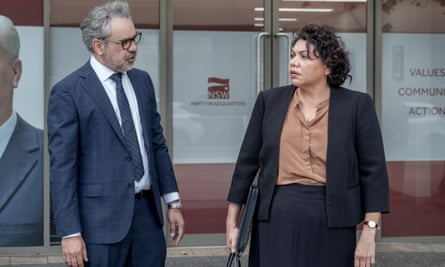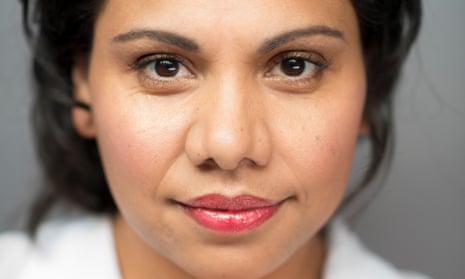Deborah Mailman is “nervous as hell”.
It’s a couple of weeks before the airing of the second season of Total Control, a political drama featuring Mailman as the lead character, Alex Irving – a Queensland woman who is whisked into the Machiavellian intrigues of Canberra politics and duly upsets all the apple carts. In the first season, her performance was lauded as “superb”. In the new season, she is formidable.
She lets out a gush of air, a double fist pump and her broad, perfect smile. “Oh, thank you for saying that!”
“It feels … ” she pauses. “More pressure this time around.”
From the beginning the role of the rookie senator was a dream for Mailman: the complex character, the storyline which cut so close to the political bone, and the exploration of issues important to Indigenous communities. It was written with her in mind; she was always going to say yes. But for the veteran of more than 20 years on Australian screens, member of many much-loved ensembles on productions such as The Secret Life of Us and Offspring, and recipient of multiple critical and popular awards, it would be her first lead role. And she was terrified.
“It’s just an insecurity I have, and I guess other actors have it too, but it’s just ‘Am I going to be good enough?’ And just second-guessing ‘How am I going to be interesting enough to have people want to watch this character?’
“I just had to really quieten my thoughts down, and just go, ‘Do what you’ve always done: stick to the script, that’s what your job is, listen to the director and actors. Do what you’ve always done, Deb, and hopefully it will work out.’”

This first season ends after Alex has toppled a prime minister (played by Rachel Griffiths) and switched political parties amid inaction over the death in custody of a young Indigenous woman. The second season opens with a water crisis in Alex’s hometown which is trucking in bottled water; Alex refusing to be parachuted as a celebrity Labor candidate into a safe western Sydney lower house seat; and the unpredictable novice determined to run as an independent candidate following the suicide of a local farmer whose land was on the cusp of repossession. All the while, Mailman as the antihero emanates rage, frustration and hope while narrowly avoiding total self-destruction.
Mailman won the Aacta award for best actress in a TV series for her performance in the debut season. But still, the pressure remains.
“I think it’s getting more so as I get older. I don’t know why,” she says. “I had more fearlessness when I was younger.” In her earlier career, she didn’t have a lot of self-doubt; she would say yes to opportunities, eager to build experience and stay in work.
“It’s a weird, weird position to be in because you think the older you get, the more free and calm and confident [you become], and sometimes I don’t feel that I am.”
The picture of disarming charm and open self-doubt, of sentences punctuated by laughter and warmth, is radically removed from the rage Mailman channels throughout her performance as Alex. It is a hypnotic rage to observe, the audience not quite sure whether it’ll lead to glory or her undoing. Mailman loved playing that explosion, she says; it was not hard to find.
“Oh! I have a temper. It’s there,” she smiles. “I’m probably more reserved than Alex in terms of my temper because I can’t be going around screaming at everyone. To be able to do that within a character, I felt quite relieved at the end of it all. It’s really a cathartic feeling for me just to go ‘carghhh!!!’
“It’s like, ‘Huh. Alright. That felt good.’”
The anger, says Mailman, is something she has “probably” become more comfortable with as she has grown older. She turns 50 next year. But it has always been there, she says. “Growing up in Mount Isa – love it to death, but it’s a rough town.”
During her childhood in the outback mining town, with her Indigenous stockman father – a rodeo star – and her Māori mum, the famous actors of the day did not look like her. There was no TV that reflected her experience. “In fact, there was no encouragement or celebration of being a First Nations person,” she says.
Mailman is also one of the voices in children’s TV animation Little J and Big Cuz, which features a predominantly Indigenous cast of children and adults set in a remote town. A show like that when she was growing up would have, she says, “allowed me a sense of belonging, and say ‘Oh, OK, I get this. I understand now.’
“Maybe things would have made a lot more sense. You know, I grew up in the 70s and 80s. There was next to no information about Indigenous history or what it meant to be on country. Zero. Zero, zero, zero.”
She got that kind of information from her dad’s side, but like any child her world was popular culture, absorbing the images and messages from TV and music. To see a show like Little J and Big Cuz when she was growing up, to know of a famous star who looked like her – it would have made an impact.
In the latest season of Total Control, Mailman’s Alex is contrasted against Wayne Blair’s Labor operative Paul Murphy. In one scene they clash, and it becomes apparent that Blair is plausibly angling to become Australia’s first Indigenous prime minister.
“I remember reading the script going … just like … fist pump. That’s why I love this job so much, being able to throw out those possibilities, to show the potential of what could be. It gave me goosebumps, it really did,” she says.

“Why we do this show is so mob, especially, get to see our stories reflected. To see black faces on screen, to see First Nations characters be nuanced in writing and performance – that’s really important.”
Mailman says Australia is “absolutely” getting better at putting black and First Nations characters and stories on screen. When she began her career in the theatre in the 90s, she had encountered Indigenous pioneers – Rhoda Roberts, Lydia Miller and others – who had been working for years “so that I could get the opportunities”. Since then, there has been years of investment in career pathways, in talent. Writers’ rooms are opening up to First Nations writers, and Indigenous creatives are moving into producing and directing.
“I mean, it had to happen. It was going to happen. It just took it’s bloody time getting there,” Mailman says. “But now we’re here, and it means that our writers and creative thinkers can take our stories anywhere, in whatever genre we want to tell our story within. So it’s really exciting, actually.”
In an interview long ago, before she reached the status that she now commands, Mailman resisted being called a trailblazer. It’s weird, she says now, laughing.
“I’m certainly not ignorant of what I’ve done, and how people have looked to me ... But it’s a weird thing to sort of put my hands on my hips and -” she deepens her voice – “I’m a trailblazer!” She laughs, again.
“I just love doing what I do. And the love is still there,” she says. “I’ve been really lucky. I’ve been looked after very much in this industry. I’ve been given opportunities – and taken advantage of those opportunities, too.”
Earlier this year, The 7 Stages of Grieving, the play Mailman co-wrote with Wesley Enoch more than a quarter century ago, was restaged around the country. It deals with the many stages of grief and dispossession of First Nations Australians. Mailman does not consider herself a writer, but she has another work – “a passion project” – bubbling away in the wings.
For the past four or five years, Mailman has been working with a group of mates on developing a new work. Based on the story of Mailman’s cousin, Keelen Mailman, who is one of the first Indigenous female cattle ranchers in Queensland (recounted in an autobiography The Power of Bones), the actor is working on adapting the story to live performance. Along with Shari Sebbens, Paige Rattray and Jake Nash, Mailman has brought on a range of Bidjara artists to respond to the story of Keelen, in a work which will be immersive, interactive and multi-artform. “Yeah, it’s ambitious. It’s big,” she says. “We’re slowly drawing everything together now and hopefully it will find a home somewhere.”
The process has been not only a creative one, but of re-engaging with her dad’s world, some two decades after his death.
“I reconnected with Keelen, and that’s really opened my world again in terms of reconnecting back with my dad’s family, to language, to country,” she says.
Travelling back and forth to Bidjara country, she is learning the language bit by bit. She laughs: “I’ve got a long way to go.” Her two sons, she says, will be learning language too. “Maybe it’s not until they get older – that’s how I was. I didn’t listen to anything as a kid, but as I got older I was like ‘Oh, OK. I really want to go back now,’” she says. “I should have listened to Dad.”
While Mailman has a love for far-north Queensland, she remains near Wollongong, south of Sydney. She has lived there for about 15 years, with her sons and husband. It’s near the beach, on Dharawal country. But with Covid border closures, she has not been back to far-north Queensland, or her mother, who lives in an aged care home, for more than two years. They FaceTime, or try to. “I miss her so much,” she says.
But she won’t be rushing up to Queensland soon, nor chasing another gig. She hopes for a third season of Total Control, but “nope, nothing” on the cards for the moment. It’s by choice. She is happy to be home. She no longer needs to say yes to everything – and she doesn’t.
The second season of Total Control screens on ABC and iView from 7 November

Comments (…)
Sign in or create your Guardian account to join the discussion